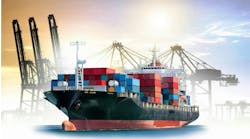As a member or leader of a procurement team, you may have heard that a new ISO9001 standard, which addresses quality issues in business organizations, is in the final stages of review prior to release. Due to be published in September, the new ISO9001 standard will be the fifth revision of the standard since its launch in 1987. The new ISO9001 standard is being closely watched by quality departments and procurement teams alike.
You may be wondering how this new revision will affect requirement flowdown and risk management in your supply base. But before answering this question, it is important to understand the driving factors behind the upcoming revision. According to ISO's Technical Committee number 176, the revision will be a response to growing complexity in supply chains. In particular, supply chains are increasingly global and increasingly reliant on technology to collect actionable data. Preliminary information suggests that these two trends are influencing most of the major changes in ISO90001:2015.
The Impact on Flowdown
The growing complexity in supply chains makes it more and more difficult for a standard such as ISO9001 to adequately meet all the needs of an ever-increasing customer base (ISO9001 customers). To overcome this challenge, ISO9001’s fifth revision will seek to limit industry-specific requirements and transfer the focus to meeting customer requirements and needs. If the focus is transferred to ensuring that products and services meet customer requirements, then less focus will be spent on outlining specifics within the standard itself. Another push in the new ISO9001 revision is to align the quality management system policy and objectives with the strategy of the organization it is supporting. This will enable top-down involvement by all levels of management, including buy-in from senior management.
The Impact on Risk Management
More and more emphasis is expected to be put on risk management, shifting focus away from corrective action. This can already be seen in standards from AS5553 to AS6174 (which address counterfeit electronic component avoidance) and will now be more apparent in ISO9001. Information is more available than ever, and ISO9001 will be pushing organizations to use data to proactively measure and monitor their supply base. With the emphasis on risk monitoring, organizations should move from managing risk to preventing it. The standard will focus less on product-specific issues and instead on companywide risk factors. Risk-averse thinking will also touch on the fact that companies now have facilities, customers, and suppliers located throughout the world. The upcoming AS9001revision will address globalization by emphasizing training and ensuring that training aligns with industry requirements as well as customer needs.
Conclusion
The new ISO9001 revision may be more difficult for quality departments to implement due to the removal of the quality manual requirement (old quality dogs don’t like new tricks), but it may be just the opposite for purchasing departments. Since many of the standard’s revised sections focus on customer satisfaction and risk analysis, purchasing teams will likely have the ISO9001:2015 quality standard in their corner when it comes to managing their supply base. Of course, we’ll have to wait for the final revision launch and implementation by customers and suppliers to determine the true impact. And don’t worry—ISO gives a three-year transition period for organizations before ISO9001:2008 is no longer valid.









